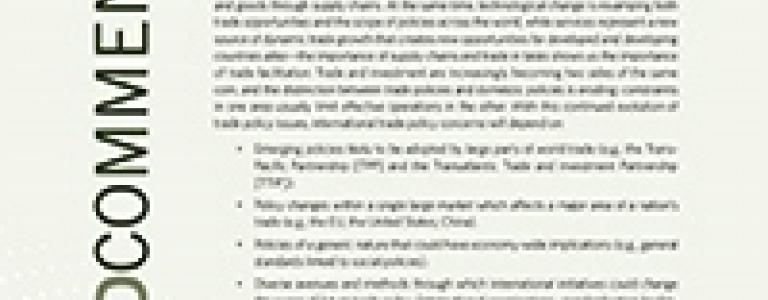Future Contours of International Trade Policy
In this commentary, Harsha Vardhana Singh argues that trade and investment are increasingly becoming two sides of the same coin, and the distinction between trade policies and domestic policies is eroding.
Policy-makers and the business community will have to develop systems for rapid assessment of impact of change and quick response. Since multiple policy issues may arise within a short period of time, mechanisms will be needed for clear prioritization of policy steps.
According to Singh, trade policy will keep evolving. Thus, in planning the future contours of their trade policy, there is a need—especially for large emerging economies—to develop a strategy for transition towards the kinds of regulatory standards and disciplines that reflect the future, such as those encompassed in the policy regimes of the OECD countries. Flexibility and quick response would become a key element of competitiveness. A system of benchmarking with others would serve as a guidepost for both the direction and the extent of progress.
In addition, nations will have to evolve ways to deal with the extensive use of private standards and the growing role of the private sector as an alternative determinant of trade policy through voluntary policies. Together with new developments in technology and social media, these factors make it difficult to govern or manage trade policy initiatives. They imply that governments need to develop or work with commonly agreed platforms or systems to enhance transparency and predictability. A key component of such an initiative has to be a systematic application of good governance principles, so as to encourage exchanging information, developing criteria for better harmonization or mutual recognition of standards, and addressing difficulties or disputes through reliable and acceptable mechanisms.
You might also be interested in
Agreement on Climate Change, Trade and Sustainability: A landmark pact for trade and sustainability
The ACCTS pact, signed by Costa Rica, Iceland, New Zealand, and Switzerland, aligns trade and environmental policies, tackling fossil fuel subsidies, eco-labels, and green trade.
Addressing Carbon Leakage: A toolkit
As countries adopt ambitious climate policies, this toolkit examines strategies to prevent carbon leakage—when production and emissions shift to nations with weaker climate policies—and explores the trade-offs of each approach.
Agricultural Subsidies: A case for Uganda
Jane Nalunga and Jonathan Lubega examine Uganda's agricultural subsidies, offering recommendations for redesigning them to foster sustainability.
Agricultural Subsidies in India: A critical balancing act
Ranja Sengupta explores the socio-economic impact of agricultural subsidies in India and underscores the need for effective policy adjustments.
